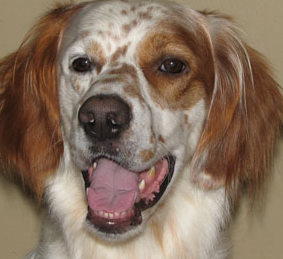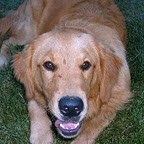|
Large Dog BreedLarge dog breeds are classified as dog breeds weighing 50 or more pounds. Very large dogs weighing around 100 pounds or even more are considered to belong to the giant variety. Large to Medium dog breeds range between 35 to 65 pounds. If you want a dog in the large dog breed category, think about these things first: energy level - yours and the dogs! Although some large breed dogs can live in small spaces, you'll want to think about the size of your home before deciding on a big dog. I've known people who've owned Great Danes and Greyhounds who don't live in large homes because surprisingly, these dogs don't need a lot of space when they're hanging out at home - as long as they get daily exercise. If you work all day and come home to a large dog, you have to be ready to take your dog outside to run and play. Any dog that gets bored will tend to do naughty things, like chew stuff. But a large naughty dog might eat your couch! Always research and consider a dog's exercise needs before adopting a large breed dog. If you're someone who likes to get up in the morning and go for a run, who wants to take their dog with them, space might not be an issue. But, if you have a large breed dog that you can't exercise easily, you at least need a big enough yard for them to run around in. Seriously consider what you're capable of doing. A large dog needs more room to run, so if you're not willing to take him for walks, the dog must have room to run. A dog's exercising needs depend more on the dog's nature than its size. A more high-strung dog needs more of a workout to release energy. Other dogs will be content with regular walks and occasional playing sessions, while others will need vigorous exercise to keep them happy. But a large dog that needs the same amount of exercise as a small dog will need more room. Large Dog Breed ExerciseBesides the dog's exercise requirements, think about your budget. It costs a lot more to buy food for a large dog breed; big toys are more expensive; big beds are more expensive; grooming is more expensive. If time is money, time is more expensive. Large dogs just take up more of your time. Everything you do with them takes longer than with a small dog. A small to medium sized dog potentially can exercise in your home, chasing a ball or tugging on a toy with you. A large dog that runs around your home might knock over your China cabinet. Their tails might remove the coffee table of that precious crystal piece you love. What about grooming? My dog is considered a large breed dog. Sydney is a Newfie/Lab, part Newfoundland, part Labrador. She weighs close to 80 pounds. Brushing her is time consuming. Bathing her is time consuming, not to mention, she's hard to maneuver. Exercising her is time consuming. And yes, if she gets bored, she will chew things. And she's five, well past the puppy stage. If there's any food left within her reach, it's gone. I left her in the car one day for a short time and when I got back, she had opened the plastic subway sandwich bag, unwrapped the paper around it, and finished my sandwich. She'll finish the cat food left in the bowl. She'll find food thrown in the garbage and eat it. She'll even open box lids and eat the contents! Now, I'm not saying that a small or medium sized dog wouldn't do the same, but the larger the dog, the larger the messes. Do you like to vacuum? Sydney's hair is everywhere - in the house and in the car. How about potty mess? Tell me, would you rather pick up small dog poo or large dog poo? I can tell you it's not pleasant when I need to pick up after her while we're on a walk and I can't find a garbage can. You have to think about these kinds of things. I plan my walks with Syd around garbage can locations! Lugging around a big bag of poo is not fun.

Large Dog Breed TemperamentConsider the dog's temperament. Large dog breed dogs tend to be gentle and good with children. They are more endurable, and can deal with some rougher handling by children. But do be cautious, no dog should be expected to put up with teasing. Make sure you teach your children from an early age how to treat pets. Larger dogs tend to be more mellow. If you have a cat, you need to adopt a dog that will not bother her. And if the cat bothers your dog, you'll want a dog that will not retaliate. Sydney stays clear of our cats, as long as they don't go near her food or toys. Sometimes we have to remind her that the cats don't want her toys. If she gets testy when the cats get near a toy of hers, we scold and take the toy away. She's never tried to hurt the cats, but she's big, and has the potential. We always admonish her for any aggression she displays toward the cats. She was the intruder, after all. The cats were both adults when we adopted Syd. I'm sure they kept wondering when she was going to leave!
Large Dog Breed Health IssuesLarge dog breeds have some specific health related issues, including hip dysplasia. Hip dysplasia is the most common inherited orthopedic disease in large and giant breeds and many medium-sized breeds. It is caused by a loose fit of the ‘ball and socket’ hip joint. The ball may continuously slide part way out of the socket. Over time this may cause osteoarthritis in the joint and the dog will become weak in the hind end. This is one of the things I worry about most with my dog. It's important that she isn't overweight, so I feed her the recommended amount for her size and avoid giving her many treats. I rarely give her people food as constant snacking on human food is a sure cause of a dog becoming overweight. I want to keep Sydney healthy forever! Here's a handy calorie calculator to ensure your dog's proper healthy weight. Use the Calorie Calculator Powered By Train Pet Dog Be aware that dogs can receive some relief with medication, including anti-inflammatories, but some cases are so bad that the dog must have surgery or be euthanized. I couldn't forgive myself if I didn't do everything I could to ensure this didn't happen to Syd. Bloat is another thing I worry about. (I'm not a big worrier, but I do worry about Sydney's health). Bloat s a dangerous and life-threatening condition. Bloat causes the dog's stomach to swell and fill with gas and fluid, causing twisting which shuts off the blood supply to the digestive organs. If a dog is not rushed to a veterinarian he can go into shock and die. The exact cause is unknown but swallowing air while quickly eating a large meal, and exercising soon after a meal are contributing factors. So...I am always sure not to feed Syd for an hour after she exercises. And because bloat can also be caused by overfeeding, it's another reason I watch carefully how much she eats. Bloat can be detected in the beginning stages when you see your dog in distress. Her stomach will be taut and swollen soon after eating. There are several diseases of the heart that large dog breeds are susceptible, and you should check with your veterinarian if you have any concerns. Of course, you should always check with your veterinarian if you have any health concerns regarding your dog. 
Return from Large Dog Breed to Choosing a Dog
|





